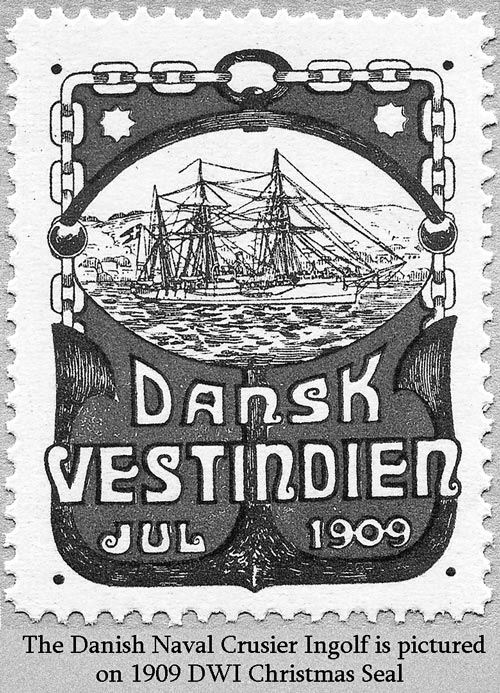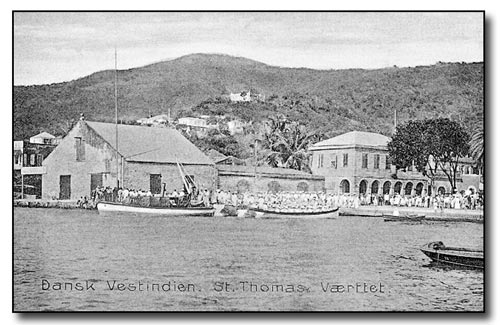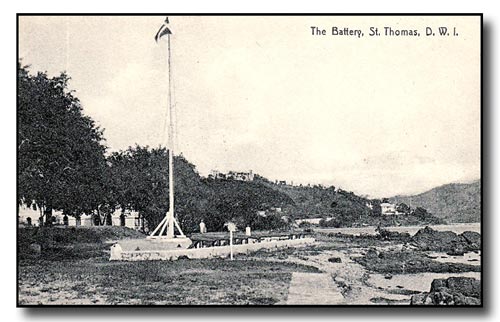Christmas Eve aboard the Ingolf
(By Olaf Linck, as translated by Nina York)
(Olaf Linck (1874-1958) was a prominent Danish journalist and novelist, winner of several awards. In his preface to the autobiographical book “The Land We Lost – Memoirs from the Danish West Indies” from which this excerpt originates, he describes how his interest in the islands was awakened. As a reporter with a staunchly conservative newspaper in Copenhagen in 1902, he became witness to a memorable scene, when a 96–year old member of the upper house of the Danish Parliament had risen from his sickbed and traveled to Copenhagen from northern Jutland in order to cast his deciding vote that halted the bill before the legislature to sell the Danish West Indies. That decision caused major initiatives to be taken to improve the economy of the islands over the coming years. The original version of this story is in Danish and SJHS member Nina York has graciously done the translation and provided it to the Society for publication. Our thanks to Nina for this wonderful contribution to our December issue.)

If on Dec. 24 in the afternoon, about the time the Christmas candles are being lit back in Denmark, Queen Alexandrine’s ears had been ringing, it would have been just the moment when the birthday salute was being fired off in St. Thomas harbor. Like the INGOLF, foreign warships had decked themselves with their flag decorations in honor of the Danish queen, and the magnificent harbor presented a very festive appearance when the 27 shots of the salute were fired off from the fort and the ships.
As the evening approached, I sailed out to the INGOLF in response to an invitation by the officers to spend Christmas Eve with them and the crew. It turned out to be a festive and unforgettable celebration.
An hour before sunset, when the thermometer in the shade showed 29 centigrade (90° F) the crew was enjoying the extra meal. It had been anticipated with excitement. In the rice porridge, which was followed by ham and green peas, accompanied by red wine, an almond was to be found, and the lucky finder of that almond would in addition to his raffle prize be presented with a splendid brass desk set.
The almond did not turn out to correspond to the famed depth chartings of the INGOLF, as it was found right at the surface and at the first shot, and by whom? –how Christmas spreads kindness!–by the only man on the tour whom it had been necessary to arrest and put into the dark brig. He would probably show himself as a perfect constable the remainder of the tour.
INGOLF herself provided an invitation to festivities. Huge coconut palm fronds had been placed along the gunwales, and in the center of the after deck was the Christmas tree, a West Indian holly that in its shape reminds of the Danish spruce. The crew had this evening split up into categories and dined in little arbors, hidden by flags and palm fronds.
In the mess sat the petty officers, and here the leader was the brilliant boatswain Thostrup, known for his participation in the Denmark expedition. Second class petty officers celebrated at the bridge; the cadets as well, divided into classes. And so all celebrated Christmas each in their separate festive environment, which naturally caused jolly speeches, songs and cheers to sound without ceasing and mixed in with each other throughout the deck.
The artillerymen were particularly fortunate; they had received a real Christmas tree from Denmark. Many of us went in to enjoy its fragrance and wish everyone in the room Merry Christmas – that earned us a twig of spruce, a tiny one, which had lost most of its needles but still retained the fragrance that helps us remember the time of year but forget about the place. Most of these young people had also forgotten that they were aboard the INGOLF in St. Thomas harbor. The Christmas mail has given leave to their thoughts. Look how the letters are flowing all over the table! And the photographs of the ones left at home. And how the face looks so full of anticipation when the pictures are being shown to a stranger. Will he like it?
Also the officers exchange their photo greetings among each other. All are delighted to again be with the daughter of the chief; she incidentally is also present as the invisible Christmas elf. And we meet the ship’s doctor’s, Dr. Riisager’s handsome young boy – how he looks like his dad, everybody says.
As the sun sets, the Christmassy mood is briefly interrupted by duties. The crew has to climb up and take down the flags. The second in command, Captain Münter, rouses them and soon the command is heard loudly. “Ready to climb!”

After the Dannebrog has been taken down, and the national anthems of the countries represented by their warships in the harbor, and “King Christian” ( Danish national anthem at that time ) is played, it has grown dark enough to light the tree and start the real Christmas celebration. We all gather around the tree and sing the old hymns. There is a serious look in people’s faces – no one is chatting – Christmas is knocking at the door for everyone. In such deep silence that we can hear the light breeze move the flames of the burning candles, the Captain reads the Christmas gospel: “And it came to pass in those days…”
At the end he recites the Lord’s Prayer and concludes with the words: “God bless the King!” which is repeated by the entire gathering.
Then the Chief delivers a salute to the esteemed birthday celebrant. “It is a double day of festivity for us Danes, because in addition to Christmas we celebrate our dear young Queen’s birthday. Although having come from a foreign country, the Queen embraces all that is Danish with the warmest interest, and she loves our country. You all saw last summer the Queen’s interest in the Navy when she came aboard the INGOLF, and how sweet, happy, and pleasant she appeared among us. Let us wish the Queen a bright and happy future and call out a nine-fold cheer of Hooray!
Captain Gotschalk had his own plain and calm way of addressing his people, but the more ring there was in the shouts of hooray that followed.
Sweet, happy and pleasant: that is how you describe a Queen if she is so. It is indicative hereof that the answer Queen Alexandrine gave to a naval officer when he asked her why she on a certain occasion had not accompanied the King aboard the vessel was: “Well, I heard that there were so many fancy folks coming, and that was not what I cared about!”
When the hoorays for the Queen quieted down, the chief finally wishes everyone a Merry Christmas. He mentions that they have to celebrate the occasion far away from home. But he is sure that they have sent many thoughts to parents and siblings, wife or girlfriend, as he is sure they in turn have sent loving thoughts across the Atlantic to them. He says that they have tried to make the occasion aboard as cozy and home-like as possible, so that the homesickness does not take hold, and he wishes everyone a Merry Christmas.
Thank you, and the same to you, is the response from the cheerful voices – and then the fun part of the festivities begins. First there is a raffle. The gifts have been bought in Copenhagen with money supplied by the Department of the Navy, and what a colorful Christmas assortment it provides: Little alarm clocks, smoking accessories, pocket knives, coin purses, stationery, picture frames, post card albums. You take a number from the Christmas pixie. He looks great, dressed in grey woolen stockings, wooden clogs, knickers, a red knit cap and big (stuffed) stomach on which the tombola rests. There are no losing tickets.
After everyone has received his gift by First Lieutenant Arlaud, one continued to the next Christmas display. Here the witty musicians distribute little gifts – one offers oranges, another bananas, another Non Plus Ultra cigars with a paper ring, wrapped in foil. With the fourth musician you ‘shoot’ five second-rate cigars.
Following the crew, the petty officers pull their ticket, and last the officers. With sadness they witness the clocks being taken and the shag tobacco remaining – because the clocks are remarkable in that they run without having been wound ever since we left Copenhagen, says Quartermaster Sternow. The Captain wins two pieces of violet soap and a picture frame, but most of them have to be content with a little shag pipe and a pack of Birds Eyes at 17 Øre ( very cheap). The mess chief, Captain Münter, immediately prohibits the smoking of the tobacco in the mess hall!
With arms loaded, the crew has retired to their quarters, where an ice-chilled punch awaits them. Shortly thereafter the Captain comes around and greets with his glass all the groups.
At the following dinner for the officers on the after deck a hearty toast is made to all those back home. The second in command mentions that Captain Gotschalk’s daughter has provided the decorated Christmas tree that sheds bright light at the center of the table, and that she has provided everyone seated at the table with a miniature Christmas tree, filled at the bottom with candies and decorated with flags and Christmas pixies.

My table neighbor, Lieutenant Pade suggests that we greet each other with a toast as family men, and his serious, dark eyes acquire a special gleam when he adds:” I hope my children have long ago gone to bed and are asleep”. It is also his home that fills the thoughts of Marine Engineer Holm, when we later on talk over coffee in an aft location outside the range of the bright light of the lantern. Fortunately, no one could look into the future. The following year, Captain Münter, as one of the first Navy aviators, crashed with his plane in the Øresund and was killed.
But there is no time to succumb to very deep homesickness. Another Christmas display table appears on deck. On behalf of the mess. First Lieutenant Michaelsen and Lieutenant Frandsen have ransacked St. Thomas shops, and some strange–looking packages are being handed to the second in command with the request to read the accompanying rhyme, happily authored by First Lieutenant Arlaud. The rhyme was written before the shopping spree and it naturally elevates the amusement when the intended item could not be found, such as when Lieutenant Østrup instead of a chair to sit on is handed a small piano. Captain Gotscholk receives a troll jumping out of a box – a hint about the horror created when the Chief makes an unannounced inspection of the guard! Lieutenant Lungersen, who is a capable horseman, is gifted with a toy horse, and Lieutenant Krandrup, the 20–year old ladies’ favorite, receives a doll dressed in nothing but blue stockings.
Even the writer guest is given an appropriate gift – a blackboard and a dozen chalks and a wastebasket. “We think you get the idea!” the young lieutenants call to me.
“Aren’t we having a good time even though we have to do without the women and children?” asks Captain Münter. He is engaged, child–like, in placing a little percussion cap in a small cannon – because he is an artillery man. And soon a bang is heard, trumpets blare, and the rattle of mechanical toys fill the air on the afterdeck of the Danish Navy vessel.
Also a bit of evening entertainment is offered. One of the ordinary seaman artillery men, engineering student Thonning, who was discovered at a recent party to be a talented impersonator, entertains the crew and us with several skits, among others a true to life impersonation of Herman Bang as a lecturer, – but then the celebration has come to an end, and the whistle blows for hammock delivery.
Back in town in St. Thomas I did not shut an eye. Shouting, singing and playing music the entire black population tramps through the streets to chase away evil spirits, and even at sunrise it keeps the town awake. But the noise cannot banish the happy mood that I experienced about INGOLF. Old melodies sound in my ears, and I will long retain the image of the Chief and his people around the lighted tree.
Such an evening can influence young minds far more than many hours of duties and discipline.
